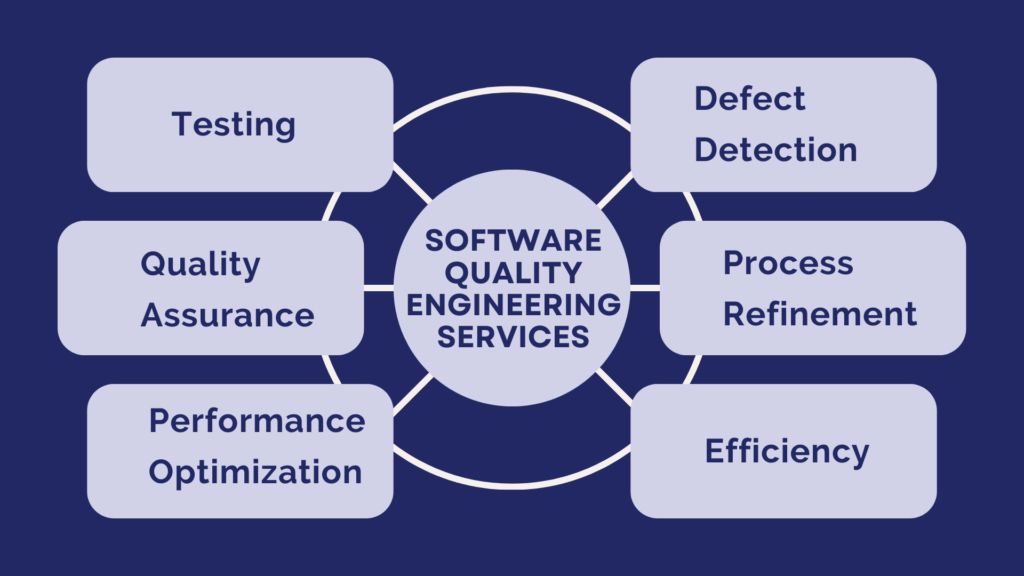In the swiftly changing world of technology, software quality engineering is essential for providing outstanding solutions. This entails using various methods and guidelines to ensure software operates effectively and is user-friendly. Also, giving importance to software quality engineering not only makes customers happier but also reduces risks and keeps businesses competitive. So, as software dominates various domains, ensuring its quality is vital. Hence, SQE provides a meticulous approach to building robust applications, addressing growing complexities. This article explores the significance of software quality engineering in today’s dynamic tech landscape. We’ll also discuss how prioritizing it can boost customer satisfaction and business competitiveness.
What is Software Quality Engineering?
Software Quality Engineering (SQE) ensures software products meet specified standards and customer requirements. Spanning the Software Development Life Cycle (SDLC) from planning to maintenance, SQE targets reliability, efficiency, and customer satisfaction. Moreover, employing rigorous testing methodologies, mitigates risks, cuts costs, and boosts performance. SQE professionals, or Software Quality Engineers, craft and implement testing strategies. They identify defects and promote a culture of quality within development teams. Their role is crucial in delivering high-quality software consistently. Furthermore, they collaborate closely with developers, project managers, and stakeholders. Also, they aim to deliver a defect-free product that meets high-quality standards and is user-friendly before its release.
Software Quality Engineering Services

For organizations devoted to exceptional software, software quality engineering is vital. Its services include testing, quality assurance, and performance optimization, enabling smoother development, early defect detection, and quicker releases. Ultimately, they elevate customer experiences and foster business triumph. SQE services encompass crafting comprehensive test plans, developing automated test scripts, and evaluating performance under load. Additionally, they address security vulnerabilities, optimize usability, manage defects, and refine quality assurance processes. Hence, leveraging such services strengthens software development processes, ensuring high quality and efficiency throughout.
Role of a Director Software Quality Engineering
Director Software Quality Engineering leads the organization’s SQE function, setting quality vision and strategic goals. Moreover, they manage a team, nurture collaboration, and ensure professional development. This role involves maintaining relationships with stakeholders, integrating SQE practices into the SDLC, and advocating for software quality. Additionally, they stay updated on industry trends and technologies. Collaborating with cross-functional teams, they enforce quality metrics, drive improvement initiatives, and promote best practices. Furthermore, through their guidance, organizations navigate software quality engineering complexities, achieving superior quality and efficiency. Hence, this role sets standards, fosters quality culture, and guides strategies, helping organizations navigate SQE complexities for peak efficiency.
Software Quality Engineering Course
A Software Quality Engineering Course is designed to provide individuals with the necessary skills for a career in SQE. Furthermore, it addresses subjects such as software testing techniques, quality assurance methodologies, and tools for software quality management. These courses provide practical insights and hands-on experience. Moreover, they enable learners to design and implement quality plans, conduct effective testing, and oversee software project quality. Consequently, it enhances career prospects and keeps professionals updated on industry trends.
Furthermore, for aspiring software quality engineers, comprehensive courses offer a foundational skill set and industry best practices. Taking these courses imparts skills for roles like quality assurance analyst, test engineer, or quality assurance manager. They represent significant milestones in one’s professional advancement. Therefore, they provide both practical knowledge and valuable certifications to validate expertise in the dynamic field of SQE.
Software Quality Engineer Certification
Highlighting a professional’s dedication to excellence and mastery of SQE principles, the Software Quality Engineer certification signifies a commitment. Accredited certification pathways, provided by esteemed organizations like the American Society for Quality (ASQ), give priority to continuous learning. They emphasize the adoption of industry best practices, which collectively solidify one’s expertise in the field.
Attaining a Software Quality Engineer Certification showcases adeptness in efficiently managing software quality. Certification holders are highly valued by employers for their expertise in SQE principles. The rigorous training and examination process ensures a deep understanding of quality engineering concepts, opening doors to advanced career opportunities and leadership roles within the field.
Why SQE is Important?
SQE is important because it:
- Ensures a better final product by identifying and addressing issues throughout development, leading to fewer problems upon product delivery.
- Promotes collaboration among developers, fostering an environment for sharing and implementing improvement ideas.
- Speeds up delivery by employing practices like Automation and AI in testing, allowing developers to finish software quicker and deliver it sooner.
- Facilitates adaptability through agile development practices, enabling teams to efficiently respond to unexpected challenges saving time and resources.
Embracing Continuous Improvement Through SQE
Continuous improvement is central to software quality engineering, driving innovation and excellence. Software quality engineers improve processes, simplify workflows, and use feedback loops to enhance software quality. Embracing continuous improvement helps organizations adapt, tackle challenges, and stay competitive. By continuously refining and aiming for excellence, SQE transcends being merely a practice; it becomes a deeply ingrained mindset within organizational culture.
Road Ahead
The road ahead for Software Quality Engineering involves adapting to new technologies and methodologies to enhance efficiency. This includes leveraging automation, AI, and agile practices to expedite delivery and manage changes more effectively. It’s also important to keep improving teamwork and processes to maintain high quality. As technology keeps changing, SQE needs to keep evolving to stay effective and ensure top-notch software. By prioritizing ongoing learning and evolution, SQE will navigate future complexities, delivering superior software solutions and driving business success in the dynamic tech landscape.
In conclusion, software quality engineering serves as a cornerstone for delivering software solutions that meet and exceed customer expectations. Embracing SQE principles and leveraging quality engineering services are crucial steps for organizations to enhance their software development processes. Cultivating a culture of continuous improvement further empowers organizations to elevate their software development processes to new heights. With visionary leadership from the Directors of SQE, coupled with comprehensive software quality engineering courses and esteemed software quality engineer certifications, the industry is poised to achieve unprecedented levels of quality, efficiency, and innovation. Together, let us embark on a journey towards excellence in SQE, shaping a future where every software product reflects the pinnacle of craftsmanship and reliability.

